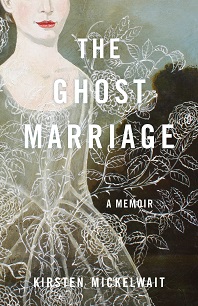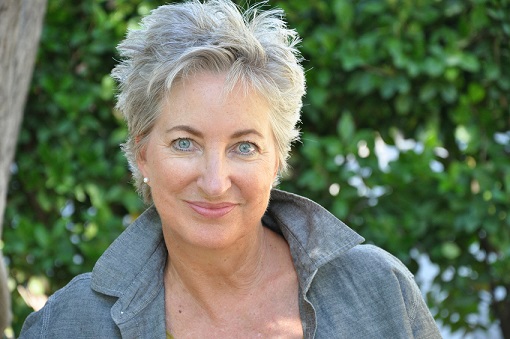Once I immersed myself in a scene, I was astonished to find how easily I could recall details that I’d previously forgotten. When you get into that zone, it’s like you’re channeling the story.
Kirsten Mickelwait – 1 June 2021
The Back Flap
At thirty-one, Kirsten has just returned to San Francisco from a bohemian year in Rome, ready to pursue a serious career as a writer and eventually, she hopes, marriage and family. When she meets Steve Beckwith, a handsome and successful attorney, she begins to see that future materialize more quickly than she’d dared to expect.
Twenty-two years later, Steve has become someone quite different from the man Kirsten first met. Unemployed and addicted to opioids, he uses money and their two children to emotionally blackmail her. The couple separates but, just after their divorce is finalized, Steve is diagnosed with colon cancer and dies within the year, leaving Kirsten with $1.5 million in debts from properties that are no longer hers. It’s only then that she finally understands: The man she married was a needy, addictive person wrapped in a shiny package.
As she fights toward recovery, Kirsten begins to receive communications from Steve in the afterlife—leading her on an unexpected path to forgiveness. The Ghost Marriage is her story of discovery: that life isn’t limited to the tangible reality we experience on this earth, and that our worst adversaries can become our greatest teachers. This is a book about life after divorce and life after death. It’s a story of how forgiveness is the best revenge.
About the book
When did you start writing the book
My ex-husband died in January 2012 and I began writing the book the following year.
How long did it take you to write it?
It took about four years to write and workshop the book; another year to edit it; about two years to find a publisher; then another six months of edits.
Where did you get the idea from?
My own life. It’s a memoir, so everything in there is real, all dialogue was recreated as best as I could remember it. That said, I didn’t want to write this book. But every friend to whom I’d told my saga said, almost verbatim, “You have to write a book about that.” The final straw came when my late father appeared during a psychic reading I was having with a medium. He was holding a copy of Elizabeth Gilbert’s Eat, Pray, Love and said, “Write a book like this” (Ha! If only). I finally capitulated. Of course, the writing process helped me to realize how therapeutic it could be to dig deep into my story and put words to those events, feelings, and relationships that previously had made no sense. In the end, the book was a gift of clarity and healing.
Were there any parts of the book where you struggled?
From an emotional standpoint, a lot of the writing and remembering was really painful. It gave me a new opportunity to wish I had handled things differently, especially during my marriage. From a technical standpoint, I struggled with how to write about the more paranormal aspects of my journey, and worried that it would seem implausible to many readers. There was also the part at the end of the process where I had to cut 34,000 words—about 25% of the manuscript—to bring the book to a length the publisher wanted. That was not fun.
What came easily?
Once I immersed myself in a scene, I was astonished to find how easily I could recall details that I’d previously forgotten. When you get into that zone, it’s like you’re channeling the story.
Are your characters entirely fictitious or have you borrowed from real world people you know?
It’s a memoir, so everbody’s real. But almost all the names were changed to protect their privacy. Two of the characters portrayed asked me to use their real names.
We all know how important it is for writers to read. Are there any particular authors that have influenced how you write and, if so, how have they influenced you?
Elizabeth Gilbert, Cheryl Strayed, Anthony Doerr, Maggie O’Farrell, and Melissa Banks, to name just a few. It’s all about voice: How do they move me or make me laugh? How do they keep my attention? How do they balance narrative with exposition and dialogue?
Do you have a target reader?
For this book, I’d say my target reader is a woman over forty who’s been divorced, is raising teenagers, is discouraged by online dating, and believes in the afterlife. Come on, I know you’re out there!
About Writing
Do you have a writing process? If so can you please describe it?
I’m one of those writers who has to use an outline. Once I have all my facts and references aligned, I just type and see what comes out. I’m also a writer for my day job, so by the evenings I’m pretty tired of sitting at my computer, but I try to spend 30 to 60 minutes just moving the story forward each evening. Then on the weekends I’ll make more progress. Word count can really vary, so I don’t measure myself by words written each day. Instead I’ll set a certain amount of time aside, like, today I’m going to write for two hours. I keep a writing log, which reminds me that it’s the journey, not the destination. As long as I’m putting the time in, I’m happy
Do you outline? If so, do you do so extensively or just chapter headings and a couple of sentences?
I break the book down by chapters and plot points, log notes and references under each chapter, then just start writing around those notes. I might set a chapter heading like the time frame or location. For The Ghost Marriage, I had several different story lines going in the second half. I wrote each of those stories out fully, then cut and pasted them into alternating chapters.
Do you edit as you go or wait until you’ve finished?
I edit as I go, but it tends to be at the sentence level. Then I workshop everything I do in a writers’ group, which is good for the bigger-picture observations. I’ll go in and make those revisions right away, before I forget the details of what my fellow writers have said. Once the whole book is finished, I’ll hire a professional editor to look at the complete work.
Did you hire a professional editor?
Yes. By all means do this if you can afford to. Especially if you’re pitching to agents cold. Most writers just don’t have the objectivity at this level, after all the time they’ve spent on the writing
Do you listen to music while you write? If yes, what gets the fingers tapping?
I like to listen to music of whatever period I’m writing in. Right now I’m working on a novel set in Paris in the 1920s and ‘30s, so it’s a lot of Django Reinhardt and Stephane Grapelli
About Publishing
Did you submit your work to agents?
For my first novel (still unpublished), I found a small New York agent. She was good, and I got some nice responses from editors, but in the end we just couldn’t place it. For this book I pitched about 150 agents. Again, nice responses, but the genre of my work was really hard to fit into their lists. The U.S. publishing industry has shrunk so much, there are few fiction or creative nonfiction writers who can make it through that gauntlet.
What made you decide to go Indie, whether self-publishing or with an indie publisher?
I’d heard great things about SheWrites Press (voted 2019 Independent Publisher of the Year by the Independent Book Publishing Professionals Group). While it requires more of an investment from the author up front, it’s a great hybrid model and allows authors like myself—whose books don’t fit a traditional mold—to get their books out into the world
Was it a particular event or a gradual process?
I’d heard about SheWrites Press during the year or two I was pitching agents, so knew that would be my next step in the process. Then I met the publisher, Brooke Warner, at the Bay Area Book Festival, and decided to pitch her on my manuscript.
Did you get your book cover professionally done or did you do it yourself?
SheWrites does the covers in-house, and it’s a process that gives the authors much more say in their design than most publishing houses. It was a very collaborative effort. I’d found an image I liked, and they negotiated with the artist to get it. SheWrites is known for its really top-notch covers, and I couldn’t be happier with mine.
Do you have a marketing plan for the book or are you just winging it?
I hired a publicity team that’s a sister organization with SheWrites Press, but there are lots of book publicists out there. The publisher advised that, if I didn’t plan to hire a professional, I should let them know so they could order a lot fewer books. That was pretty convincing.
Any advice that you would like to give to other newbies considering becoming Indie authors?
I wouldn’t discourage them from giving it the old college try as to pitching agents and going the traditional route, but to know that there are many other options available. If your book is good, it will find a publisher in due course. Don’t give up.
About You
Where did you grow up?
Palo Alto, CA—when Silicon Valley was just a few guys in a garage.
Where do you live now?
I live in the East Bay of the San Francisco Bay Area, right on the water and in the shadow of the Berkeley campus.
What would you like readers to know about you?
That I’m just getting started as a published writer. The Ghost Marriage is my first published full-length book, but it won’t be my last and it’s not typical of the writing I do. Stay tuned!
What are you working on now?
I’m about halfway through a historical novel that features a few members of the Lost Generation—American expatriates living, writing, painting, and making music in 1920s France.
End of Interview:
For more from Kirsten, follow her on Twitter.
Get your copy of The Ghost Marriage from Amazon US or Amazon UK.


